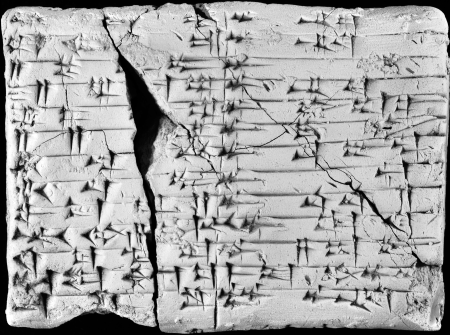Tablets from Iraq reveal lost language of biblical Amorites, adversaries of the Israelites

The existence of an ancient people who were frequent adversaries of the Israelites in the Old Testament has been corroborated by a pair of tablets from Iraq.
While the Bible frequently speaks of the Amorites, a nomadic people believed to have lived around 3,000 years ago in the region currently known as Syria and Israel, researchers have found little evidence that the Amorites had a language of their own.
Now, a research article titled Two Remarkable Vocabularies: Amorite-Akkadian Bilinguals from the Revue d'Assyriologie et d'Archeologie Orientale suggests that not only did an Amorite language exist, but it was possibly used as far east as ancient Mesopotamia (modern-day Iraq).
Researchers Manfred Krebernik, a professor and chair of ancient Near Eastern studies at the University of Jena in Germany, and Andrew R. George, an emeritus professor of Babylonian literature at the University of London's School of Oriental and African Studies, both of whom authored the study, told Live Science that some experts doubted whether the language even existed.
"Our knowledge of Amorite was so pitiful that some experts doubted whether there was such a language at all," they told Live Science, adding: "the tablets settle that question by showing the language to be coherently and predictably articulated, and fully distinct from Akkadian.
The Biblical Archaeology Society (BAS) notes that the researchers describe the pair of Old Babylonian tablets — dating as far back as roughly 1894 BC — as being inscribed with similar vocabularies and divided into two tablets. The right-hand columns are inscribed in the Akkadian language, while the language used in the left-hand columns is what researchers called “North-West Semitic, with some admixture of Akkadian.”
The artifacts are believed to be what the BAS calls "unprovenanced objects" which were likely illegally taken from Iraq following the First Gulf War about three decades ago.
Each tablet was found decades later in private collections, one in London and the other in New York, according to the Bradenton Herald.
Further study of the tablets led researchers to the conclusion that the language is a variety of Amorite, similar in many ways to Ugaritic, Hebrew and Aramaic.
According to BAS, while the first tablet contains lists of deities, constellations, food items and clothing, it also has a section written entirely in Amorite, while the second tablet has bilingual phrases in both Amorite and Akkadian.
Researchers say in addition to offering further insight into when and where the languages were used, the tablets might also show a link between the Amorite language and the Canaanite language group, which also includes Hebrew and Moabite.
The tablets are said to bear a striking resemblance to the Canaanite language used in the Amarna Letters from the 14th century BC, with some of the phrases “nearly identical to modern Hebrew,” according to BAS, which said the findings also show “just how fluid linguistic barriers were in antiquity.”
Scholars say because the Amorite language was never as widely spoken as other languages, it never became the common written language in ancient Syria and Iraq, and may have instead functioned more like Aramaic did during the first millennium BC, known as the Neo-Assyrian period.
Despite their biblical fate, the Amorites are referenced repeatedly in the first five books of the Bible, known as the Pentateuch or Torah. In the table of nations in Genesis 10, the Amorites are said to be descended from the line of Canaan, Noah’s grandson.
God would not permit Abram to destroy the Amorite nation because the nation’s sins were “not yet full” in Genesis 15:16. However, the Lord later told Abram that he would remove His protective hand from the Amorites.
As the Israelites were taking the Promised Land, Joshua warned those in the land to “choose this day” whether they would serve the one true God or the false gods of the Amorites:
“Now fear the LORD and serve him with all faithfulness. Throw away the gods your ancestors worshiped beyond the Euphrates River and in Egypt, and serve the LORD. But if serving the LORD seems undesirable to you, then choose for yourselves this day whom you will serve, whether the gods your ancestors served beyond the Euphrates, or the gods of the Amorites, in whose land you are living. But as for me and my household, we will serve the LORD.” (Joshua 24:14–15).
The Amorites were eventually taken captive and forced into slavery under King Solomon in 1 Kings 9, before their final mention by the prophet Amos: “And I brought you up from the land of Egypt, and led you forty years in the wilderness, to possess the land of the Amorite.”
Ian M. Giatti is a reporter for The Christian Post. He can be reached at: [email protected].






















